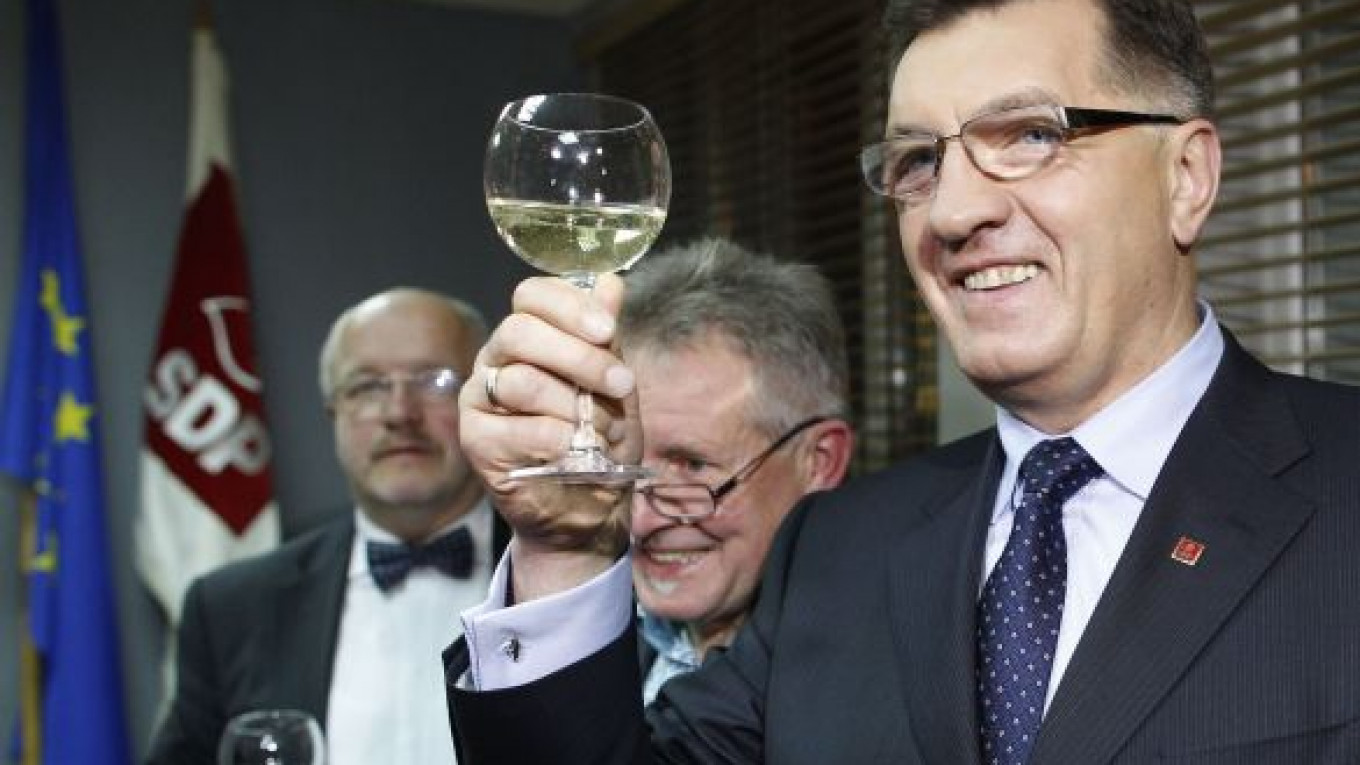Lithuania's president vetoed plans Monday by three opposition parties to form a government after a weekend election, saying claims of vote-buying and tax fraud made one of them unfit to rule.
Voters turned against Prime Minister Andrius Kubilius' austerity-minded administration Sunday, offering a warning for other European governments pushing through tough budgets.
That put an alliance of the opposition Social Democratic Party, the Labor Party and the party of an impeached former president in prime position to succeed him.
But President Dalia Grybauskaite, a former EU budget commissioner who is popular with the electorate, refused to accept the Labor Party, which faces allegations of buying votes during the two rounds of balloting.
"A party that is suspected of gross violations in the election, that is suspected of false accounting and nontransparent activities cannot participate in the government's formation," Grybauskaite said at a news conference.
The three opposition parties had said they would ease the pain of Kubilius' harsh budget cuts, which have forced many Lithuanians to immigrate in search of work.
The parties would also remain fiscally responsible, an approach that economists view as inevitable given Lithuania's high borrowing needs.
But the decision by Grybauskaite, whose task it is to name a prime minister, throws their plans into doubt.
She said that she probably would name Social Democrat Party leader Algirdas Butkevicius prime minister eventually, but she insisted that the Labor Party not be in the coalition.
"I will give support only to that political party which can form a majority without the Labour Party, which is sitting on bench of the accused," referring to the ongoing trial.
That could throw a lifeline to Kubilius, who has said he would not necessarily be against forming a rainbow coalition with Butkevicius.
Butkevicius, a former finance minister, whose party will be biggest in parliament, told reporters he could not say now whether the Labor Party will be in his government or not.
If he wanted to avoid conflict with the president, he said, he could form another coalition or go into opposition.
He told Reuters earlier that he aims to take Lithuania into the eurozone in 2015, a year later than Kubilius had planned.
Butkevicius said his would-be coalition partners backed his timetable, even if during campaigning they said the country should not rush to adopt the common currency during the sovereign debt crisis.
"I think we will have the euro in 2015. ... I am optimistic," Butkevicius said.
In two rounds of elections, the first two weeks ago and the second on Sunday, the opposition won a combined 78 seats in the 141-seat parliament.
The Social Democrats won 38 seats and the Labor Party 29, while 11 went to the party of former president Rolandas Paksas. Kubilius' Homeland Union came in second with 33 seats but was isolated in parliament and has little hope of retaining power.
The president said police were investigating 27 reports of election irregularities, of which 18 were alleged vote-buying. The Labor Party is implicated in most of them.
The party's leader, Viktor Uspaskich, is also on trial for alleged tax fraud in his party from 2004 to 2006, which he denies. The party increased its number of seats in parliament from 10 to 29.
"We call our state a democratic state ruled by law," Uspaskich said on public television. "The principle of the presumption of innocence must be adhered to. The will of the people must not be spat on."
Kubilius won praise abroad for slashing the budget deficit after a brutal economic crisis four years ago. The economy has returned to growth and rose a faster-than-expected 4.4 percent in the third quarter.
But the outgoing prime minister saw his popularity slide at home as wages fell, unemployment rose and tens of thousands of people left the small Baltic country in search of work.
The opposition parties have said they would aim to increase the minimum wage, make the tax system fairer and boost investment.
Economists say a new government will have little room to ease the austerity, as Lithuania needs to retain the confidence of debt markets.
The country needs to raise 7.6 billion litas ($2.85 billion) in 2013, about 6.5 percent of projected gross domestic product.
Butkevicius has said he would stick to the outgoing government's 2013 budget deficit target.
Related articles:
A Message from The Moscow Times:
Dear readers,
We are facing unprecedented challenges. Russia's Prosecutor General's Office has designated The Moscow Times as an "undesirable" organization, criminalizing our work and putting our staff at risk of prosecution. This follows our earlier unjust labeling as a "foreign agent."
These actions are direct attempts to silence independent journalism in Russia. The authorities claim our work "discredits the decisions of the Russian leadership." We see things differently: we strive to provide accurate, unbiased reporting on Russia.
We, the journalists of The Moscow Times, refuse to be silenced. But to continue our work, we need your help.
Your support, no matter how small, makes a world of difference. If you can, please support us monthly starting from just $2. It's quick to set up, and every contribution makes a significant impact.
By supporting The Moscow Times, you're defending open, independent journalism in the face of repression. Thank you for standing with us.
Remind me later.






